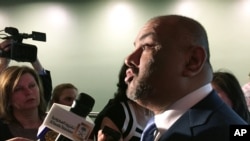Yemen's ambassador to the United Nations said Wednesday that U.N.-led talks aimed at ending the conflict in the Middle East's poorest nation would begin June 14 in Geneva.
Ambassador Khaled Alyemany told The Associated Press that the United Nations was expected to officially announce the date shortly.
But there was still some uncertainty among members of the U.N. Security Council who were briefed behind closed doors by the U.N.'s new special envoy for Yemen, Ismail Ould Cheikh Ahmed.
"Hopefully the 14th,'' Angola's U.N. ambassador, Ismael Abraao Gaspar Martins, told reporters as he left the council meeting.
Ahmed's first attempt to hold talks was postponed two days before the parties were to meet on May 28 after a request from Yemen's government and other parties for more time to prepare.
The conflict pits Yemen's exiled President Abdu Rabu Mansour Hadi against Iranian-backed Houthi rebels — who seized the capital, Sana'a, last year — and military units loyal to former Yemeni President Ali Abdullah Saleh. A Saudi-led coalition began launching airstrikes against the Houthis and their allies March 26, shortly after Hadi fled a rebel advance on the south. Since then, airstrikes and ground fighting have killed more than 1,000 civilians and displaced a half million people, according to the U.N.
Secretary-General Ban Ki-moon has been urging the parties to drop preconditions for the talks, an appeal Ahmed has made in numerous meetings with the feuding parties.
An aide to Hadi said Tuesday that the president had agreed to travel to Geneva for the talks. The rebels' second-in-command said the Houthis also were ready to go to Geneva.
Yemen's Alyemany said that "if Houthis are reacting positively ... things can move easily.''
He said Ban was expected to open the Geneva meeting and Ahmed would then meet in "one room'' with the parties and their supporters. "It will be around the same table,'' the ambassador said.
Russia's U.N. ambassador, Vitaly Churkin, told reporters he called for Wednesday's council meeting because Moscow was "extremely concerned'' at the delay in convening the Geneva talks, and by the impact of the conflict on civilians, especially from the coalition bombing.
"Clearly, the effects of the bombing campaign are quite dramatic on the civilian population, even on cultural, historical monuments,'' he said, but "all parties need to show restraint and stop violence.''
Churkin said he urged the secretary-general and the new U.N. humanitarian chief, Stephen O'Brien, to facilitate the delivery of humanitarian supplies and keep pushing for another humanitarian pause in the fighting.
The Russian ambassador said he also called on Ahmed to convene the Geneva meeting as soon as possible. Churken said he hoped that if the meeting began before the Muslim holy month of Ramadan's June 17 start date, discussions would continue during Ramadan until a final agreement was reached.








